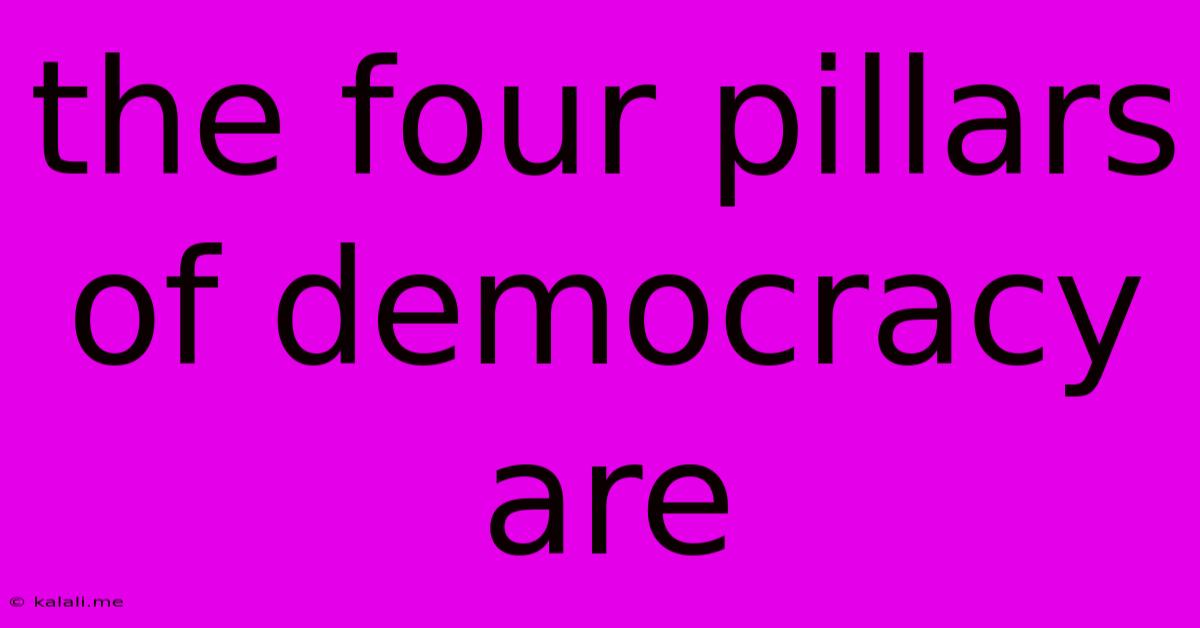The Four Pillars Of Democracy Are
Kalali
Jun 15, 2025 · 4 min read

Table of Contents
The Four Pillars of Democracy: A Foundation for Freedom and Equality
Democracy, often lauded as the best form of government, isn't simply a system of elections. It's a complex structure built upon fundamental principles that ensure fairness, participation, and accountability. This article delves into the four pillars of a thriving democracy: free and fair elections, the rule of law, separation of powers, and protection of human rights. Understanding these pillars is crucial for both citizens actively participating in their democratic systems and for those striving to build or strengthen democratic institutions worldwide.
1. Free and Fair Elections: The Cornerstone of Democratic Legitimacy
Free and fair elections are the bedrock of any democratic society. They are the mechanism through which citizens choose their representatives and hold them accountable. The term "free" signifies the absence of coercion or intimidation; citizens must be able to vote without fear of retribution. "Fair" implies an equitable process, devoid of manipulation or bias. This requires:
- Universal suffrage: Every adult citizen should have the right to vote, regardless of race, gender, religion, or socioeconomic status.
- Secret ballot: The act of voting must be private, protecting individuals from pressure to vote in a specific way.
- Independent electoral commissions: Impartial bodies are needed to oversee the electoral process, ensuring its fairness and transparency.
- Transparency and accountability: The entire electoral process, from voter registration to vote counting, must be open to public scrutiny.
- Equal access to media and resources: All candidates should have equal opportunities to reach voters through media and campaigning.
2. The Rule of Law: Ensuring Equality and Predictability
The rule of law is the principle that everyone, regardless of their position or power, is subject to and accountable under the law. This prevents arbitrary actions by those in authority and fosters a sense of fairness and predictability within society. Key aspects of the rule of law include:
- Equality before the law: No individual or group is above the law.
- Fair and impartial judiciary: An independent and unbiased judicial system is vital for upholding the rule of law and resolving disputes justly.
- Due process: Individuals accused of crimes have the right to a fair trial and legal representation.
- Transparency and accountability of law enforcement: Police and other law enforcement agencies must operate within the bounds of the law and be accountable for their actions.
- Access to justice: Everyone should have equal access to legal processes and remedies.
3. Separation of Powers: Preventing Tyranny and Abuse of Power
The separation of powers is a crucial mechanism for preventing the concentration of power in the hands of a single individual or group. By dividing governmental power among different branches (typically legislative, executive, and judicial), it creates a system of checks and balances, minimizing the risk of tyranny or abuse of authority. Effective separation of powers necessitates:
- Independent legislative branch: The legislature (parliament or congress) makes laws.
- Independent executive branch: The executive (government) enforces laws.
- Independent judicial branch: The judiciary interprets laws and ensures their fair application.
- Checks and balances: Each branch has the power to limit the actions of the other branches. For example, the legislature can impeach the executive, and the judiciary can review laws passed by the legislature.
4. Protection of Human Rights: Upholding Fundamental Freedoms
The protection of human rights is paramount in a democracy. These rights, often enshrined in constitutions and international treaties, guarantee fundamental freedoms and ensure the dignity and worth of every individual. Essential human rights include:
- Civil and political rights: These include freedom of speech, assembly, religion, and the right to a fair trial.
- Economic, social, and cultural rights: These encompass the right to education, healthcare, and an adequate standard of living.
- Protection from discrimination: Individuals should be protected from discrimination based on race, gender, religion, or other grounds.
- Independent human rights institutions: These bodies monitor human rights violations and promote accountability.
These four pillars—free and fair elections, the rule of law, separation of powers, and the protection of human rights—are interconnected and mutually reinforcing. A weakening of one pillar inevitably undermines the others, jeopardizing the stability and effectiveness of the entire democratic system. Therefore, constant vigilance and active citizen participation are crucial to ensuring these pillars remain strong and that democracy thrives.
Latest Posts
Latest Posts
-
What Is The Lcm For 15 And 25
Jun 16, 2025
-
Difference Between Cellulose Starch And Glycogen
Jun 16, 2025
-
Sample Cover Letter For Visa Application
Jun 16, 2025
-
Case Western Reserve University Average Sat
Jun 16, 2025
-
Which Memory Has Largest Storage Capacity
Jun 16, 2025
Related Post
Thank you for visiting our website which covers about The Four Pillars Of Democracy Are . We hope the information provided has been useful to you. Feel free to contact us if you have any questions or need further assistance. See you next time and don't miss to bookmark.